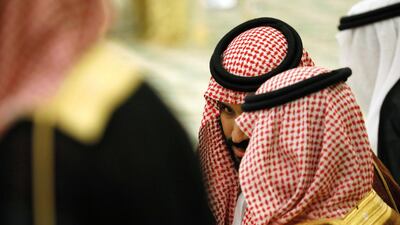RIYADH // Global headlines from Donald Trump’s talks with Gulf and Muslim leaders in Saudi Arabia largely revolved around Iran — outsize arms sales to deter Riyadh’s chief rival, and promises to move US policy back to one of containment and a united front.
Throughout his two-day visit in the kingdom, Mr Trump and his top officials emphasised that Gulf states must also do more to build their own capabilities not only to confront Iran, but also to fight and defeat extremist groups that have thrived in the region’s turmoil.
This is why the Saudi-led Islamic Military Alliance — made up of 41 Muslim-majority states — has now taken on greater urgency.
The coalition “stands for something essential and it fulfils a function that we could never fulfil”, said former US defence secretary Ash Carter at a conference in Riyadh this week.
“It has a stature and capability, particularly in the economic, political and ideological spheres that outsiders couldn’t possibly have.”
How exactly the coalition will create a framework to build up counterterrorism and other security capacities and align members’ shared long-term goals in its fight against terror remains to be seen.
But the meeting, hosted by the alliance and the King Faisal Centre for Research and Islamic Studies, which was held during Mr Trump’s visit, sought to bring the complex challenges into greater focus.
Former security officials, analysts and academics agreed that greater intelligence sharing between the coalition members is now imperative to address an interest held by all the member states: mitigating the effects of the spread — and return to their home countries — of the estimated 30,000 foreign fighters who joined ISIL in Iraq and Syria.
Saudi Arabia is a key intelligence partner for western countries, and has over a decade of experience in building up expertise to deradicalise extremists and identify and destroy their networks. How to build such capabilities would be crucial to share with coalition members.
“The issue of foreign fighter returnees is very important,” said Prince Abdullah Bin Khaled Al Saud, a research fellow at the International Centre for the Study of Radicalisation and Political Violence at King’s College London. Not all returnees are the same — some may be disillusioned and assets in countering ISIL narratives, he said.
“Some might be disengaged from violence but not deradicalised ... They will be passive when they come back to their countries but they will engage in recruitment.”
Building and sharing intelligence capacity alone — even if coupled with coordinated military efforts — will not be sufficient in the continuing political turmoil plaguing the Middle East, those at the conference said.
“Many people think that there must be some intelligence silver bullet out there that can solve these problems and these groups,” said Richard Barrett, the former head of global counterterrorism operations at MI6. “Yes, it can shine a very bright light but it’s also on a very small part of the picture.”
The greatest challenge will be the political dimensions of fighting extremism, in particular how to bring about political solutions that will end the region’s wars, which is the number one driver of recruitment for groups like ISIL, according to experts.
It was the Sunni frustration with Baghdad and a war raging in Syria — where Sunni civilians bore the brunt of the violence — that helped ISIL spread rapidly across Iraq in 2014.
For the Islamic Military Alliance, it is a reminder that ISIL will try again to regenerate this way, and underscores the need for its members to coordinate on complicated politics of post-conflict recovery and reconstruction.
One delegate from Algeria provided an example from his region. Despite the UAE, Tunisia and Algeria sharing an interest in fighting ISIL, divisions over the conflict in Libya has prevented intelligence sharing between them.
Syria, Iraq, Yemen and Libya “provide a supply of rallying cries and causes to recruit”, and provide havens for militants fleeing one country for another, Prince Abdullah said.
The longer the conflicts drag on, the more capable and resilient the extremist groups become, said Will McCants, who studies extremist movements and is director of the Project on US Relations with the Islamic World at the Brookings Institution in Washington.
ISIL, Al Qaeda and other militants now have “tremendous experience fighting wars and also in governing, because there are so many unstable places in the Middle East and North Africa where they can do this over and over again”, he said.
“The challenge for the coalition that Saudi Arabia is leading is that these organisations can frustrate attempts to stabilise civil wars because they are not locals, and so are not invested the way local insurgents might be in ending the conflict,” Mr McCants said. The relationships between fighters who disperse and the financial networks that funded them continue long after a conflict ends, he added.
“Counter-terrorism data has to be heavily localised,” said Elisabeth Kendall, a senior research fellow at Oxford’s Pembroke College. “What radicalises someone in X place is very different from what radicalises someone in Y.”
In Yemen, she added, Al Qaeda’s local affiliate has drawn support from some Yemenis who do not necessarily agree with their ideology but rely on it for the services it provides in the absence of a strong state.
The problem with Yemen is not radicalisation, “it’s passive toleration”, she said.
“We have to address community development and particularly education. It has to be much more bottom up and much less top down if we’re going to get anywhere.”
tkhan@thenational.ae

